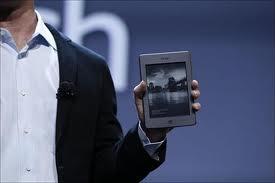 Given all the hype of the past few weeks, we're tempted to write, yes, Amazon introduced its new tablet yesterday--and leave it at that.
Given all the hype of the past few weeks, we're tempted to write, yes, Amazon introduced its new tablet yesterday--and leave it at that.
Here are the key points from the announcement made in New York City by CEO Jeff Bezos:
- The new Fire retails for $199, less than half the lowest price of the iPad ($499) and less than the Nook Color ($249). The Fire weighs 14.6 ounces and its screen is 7 inches.
- The Fire begins shipping November 15.
- The Fire has Wi-Fi, which links to its 18 million e-books, songs, movies, TV shows as well as newspapers and magazines.
- Fire doesn't have as many features as the iPad, lacking a camera, microphone and cell phone network connection. It has nowhere near as many apps as the Apple. (PC Magazine has a chart comparing the features of the Fire, Nook Color and iPad.)
- The X-Ray feature gives readers extra information about the e-books they're reading, culled in part from dictionaries, Wikipedia and Shelfari.
- The basic Kindle is now $79. The new Kindle Touch is $99, and the Kindle Touch 3G is $189.
- The Fire has a cloud storage system; the Silk mobile browser will record every Web move and transaction made by Fire owners.
More on the story: Bezos said, "I think of [the Fire] as a service. Part of the Kindle Fire is of course the hardware, but really, it's the software, the content, it's the seamless integration of those things." (Brad Stone has a long, insightful profile of the Amazon founder in Business Week.)
Bezos said, "I think of [the Fire] as a service. Part of the Kindle Fire is of course the hardware, but really, it's the software, the content, it's the seamless integration of those things." (Brad Stone has a long, insightful profile of the Amazon founder in Business Week.)
The New York Times put Amazon's approach a different way, writing, "Analysts say that the new family of devices will corral users into a tightly walled garden around Amazon's content and devices and may secure a new dominance for Amazon as an online retailer and technology company. Music is streamed using Amazon's Cloud Player, while movies and television shows are viewed through Amazon Instant Player. E-books rely on the Kindle app. Owners will have access only to Android apps approved by Amazon and distributed through its Amazon Android Store. Even the Fire's software, based on a Google Android framework, is disguised under a custom layer built by Amazon."
On his blog, Chris Espinosa outlined some privacy issues raised by the Silk browser: "Amazon will capture and control every Web transaction performed by Fire users. Every page they see, every link they follow, every click they make, every ad they see is going to be intermediated by one of the largest server farms on the planet. People who cringe at the privacy and data-mining implications of the Facebook Timeline ought to be just floored by the magnitude of Amazon's opportunity here. Amazon now has what every storefront lusts for: the knowledge of what other stores your customers are shopping in and what prices they're being offered there. What's more, Amazon is getting this not by expensive, proactive scraping the Web, like Google has to do; they're getting it passively by offering a simple caching service, and letting Fire users do the hard work of crawling the Web. In essence the Fire user base is Amazon's Mechanical Turk, scraping the Web for free and providing Amazon with the most valuable cache of user behavior in existence."
And in the snark department, sales rep George Carroll posted: "Do you think Amazon named its tablet as the answer to 'How hot does it get in the Allentown warehouse in the summer?' "

